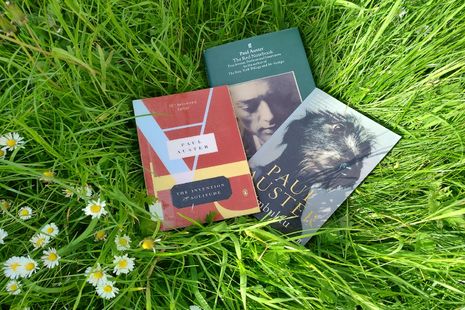‘Illusion is the only certainty’: remembering Paul Auster
Evan Grandidge de Paz reflects on the acclaimed US author Paul Auster, who died late last month after a career spanning five decades

“One day there is life… and then, suddenly, it happens there is death”
Paul Auster – just 35 when he wrote these words to open The Invention of Solitude – died on April 30th at the age of 77. As a writer whose work constantly grappled with loss, this book – the first section of which depicts Auster coming to terms with the death of his father, a distant, almost cold man – encapsulates his oeuvre. In the second part, the perspective moves to Auster himself as a father as he reflects on his separation from his own son. Auster’s writing is one of shifting personas, including an incorporation of himself as an author into a number of his novels. Often this is explicit, such as in The Invention of Solitude, where the protagonist is simply ‘A’. Elsewhere, such as in The Book of Illusions, my favourite of his works, he seems to question this idea of a one-way exchange of narrative from author to reader by making the characters themselves writers of different sections of the novel.
“I remember choosing it because it was a small book and could easily fit into my coat pocket.”
The Book of Illusions centres around university professor David Zimmer, who becomes obsessed with the life and work of Hector Mann, supposedly a silent comedian who disappeared without a trace sixty years ago. Zimmer, infatuated with Mann, tries to recover as much information about him as possible, despite Mann’s wife being tasked with incinerating his body and films after his death. As readers, we are never really sure whether Mann is actually real, or just a figment of Zimmer’s imagination. Zimmer’s output, a book about Mann and by extension himself, seems to, in Auster’s typically meta-referential way, morph into The Book of Illusions itself, leaving you with the impression that illusion is the only certainty.
My first encounter with Auster’s work came with what I like to think of as similar spontaneity at my secondary school’s summer fair. As I was leaving the event, I needed a book to read on the bus back home. Rummaging around the pile of second-hand books on sale, I stumbled across Auster’s Invisible. I remember choosing it because it was a small book and could easily fit into my coat pocket. From its memorable first line (“I shook his hand for the first time in the spring of 1967”), I can recall fond memories of sitting and exploring the twisting relationship between Adam Walker, a student at Columbia in 1967 (as was Auster), and the French lecturer Rudolf Born. Although I might see it now as slightly pedantic, I remember being impressed by Auster’s use of shifting narrative perspectives in the book, and especially the chapters told in the second person. At a time when GCSE English was attempting to make a bland, formulaic writer out of me, Auster gave me an example of how writers could go against the unwritten ‘rules’ – Invisible contains no quotation marks, for instance. I enjoyed, and continue to enjoy, the narrative complexity in his work, particularly his strong use of intertextuality.
“Auster gave me an example of how writers could go against the unwritten ‘rules’”
The 19th-century French writer Chateaubriand’s notion that “man has not one and the same life. He has many lives, placed end to end” features heavily in The Book of Illusions, and sums up Auster’s life through his work. Born in Newark, New Jersey in 1947, he moved to France to scrape a living as a translator of poetry after studying literature at Columbia University. In France, he lived in a garret and returned to the US in 1974, apparently with just nine dollars. If much of the work described so far seems very abstract and cerebral, plenty of his writings reflect this humbler period. One of the most memorable, slightly surreal vignettes from his essay The Red Notebook at one point describes him having nothing to eat except onions and pie pastry during his time in France. After doing the only possible thing and making an onion pie, he puts it back in the oven after prematurely starting to eat it out of hunger. Attempting to distract from his hunger, he goes for a walk, only to lose track of time and return to find his pie incinerated in the oven. As if by miracle, the aptly named Mr Sugar appears an hour later and treats him to dinner. “Until that moment, I thought those things only happened in books”, Auster comments.
Auster certainly did craft his identity through his books. All through his life he continued to handwrite drafts of his works, before editing them on a typewriter. Only after that would his assistant then write them up on the computer. “Stories happen only to those who are able to tell them”, he writes in The Locked Room, the third part of The New York Trilogy, which follows a disappeared writer whose work is rediscovered by his friend’s wife. I am sure that Auster’s life and work have plenty more secrets to reveal, and will continue to inspire readers posthumously. If you are unfamiliar with him, I encourage you to give his books a go, and be plunged into a world of illusion.
 News / CUP announces funding scheme for under-represented academics19 December 2025
News / CUP announces funding scheme for under-represented academics19 December 2025 News / SU reluctantly registers controversial women’s soc18 December 2025
News / SU reluctantly registers controversial women’s soc18 December 2025 News / Cambridge welcomes UK rejoining the Erasmus scheme20 December 2025
News / Cambridge welcomes UK rejoining the Erasmus scheme20 December 2025 Features / Should I stay or should I go? Cambridge students and alumni reflect on how their memories stay with them15 December 2025
Features / Should I stay or should I go? Cambridge students and alumni reflect on how their memories stay with them15 December 2025 Film & TV / Timothée Chalamet and the era-fication of film marketing21 December 2025
Film & TV / Timothée Chalamet and the era-fication of film marketing21 December 2025










